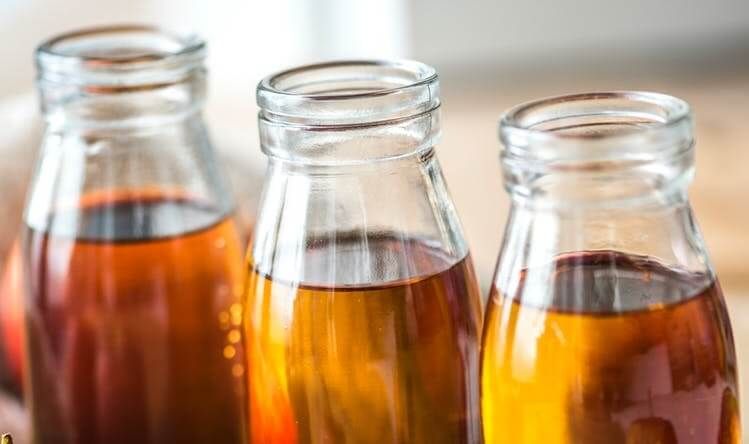Kombucha – does it live up to the hype?
by Gael Myers, Accredited Practising Dietitian
- January 8, 2019
- Leave a comment
- WA
- Alcohol
- Mythbusting
- Sugary drinks
- Shopping
- Industry
- Sugar
- Research
- Budget Friendly
- Smart Swaps
- Drinks
- Nutrition Facts

What is kombucha and how is it made?
Kombucha is a tangy, quirky tasting drink produced by fermenting sugar and tea with a SCOBY (symbiotic culture of bacteria and yeast). During the fermentation process the sugar is turned into acetic acid (also found in vinegar) and small amounts of alcohol. Kombucha joins the long list of fermented products that people consume such as yoghurt, sauerkraut, bread, cheese, coffee, chocolate, gherkins and kimchi.
Health claims for kombucha
The recent popularity of kombucha fits into a growing public interest in our digestive system and how to best support gut health with diet. Our gut contains a vast number of bacteria and other microorganisms (we’re talking in the trillions!) that for the most part live in harmony with the rest of our body’s cells. These gut bugs play a role in nutrient production and absorption, immune function, metabolism and mood. There is also growing evidence linking a number of health conditions to imbalances in the bugs in our gut. However at this stage we don’t know whether these imbalances actually cause health conditions or whether having a health condition causes the changes in our gut bugs.
Fermented foods like kombucha contain ‘good’ bacteria (also called probiotics), which are thought to help keep your gut healthy. The problem is, only a few research studies have been conducted looking at the health effects of kombucha and none of these were in humans, only rats and mice! This means, despite the big marketing claims, there’s little evidence to date to support the idea of kombucha as a health tonic.
LiveLighter investigates
Although we know that kombucha isn’t going to solve all our health problems, you might still be left wondering if it’s an okay drink to have. To find out, we analysed 77 different kombucha products (multiple flavours from 20 different companies) available in the Perth Metropolitan area. Here’s what we found:
Sugar
- Most products (99%) had less than 5g of sugar per 100mL. This means that most products met LiveLighter ‘best choice’ guidelines for sugar
- The average amount of sugar per bottle was 4.9g (just over 1 tsp)
- The highest amount of sugar per bottle was 30g (7.5 tsp)
- 44% of products contained a sweetener (stevia or stevia + erythritol)
Energy (kJ)
- The amount of energy per bottle varied from 26kJ to 665kJ (average = 176kJ)
- To put this into perspective a 600mL bottle of cola has about 1100kJ (plus 64g of sugar!)
Cost
- The average cost per bottle was $4.65
- The most expensive product cost $8.50
A quick note about home-made kombucha
If you’re thinking of making kombucha at home we have a few notes of caution before you begin! As kombucha is a fermented product it can contain small amounts of alcohol. While the amount of alcohol in non-alcoholic foods and beverages (such as store-bought kombucha) is regulated and therefore relatively low, it’s difficult to know how much alcohol is present in home-made varieties. The amount of sugar in the final product can also vary. One last thing is to make sure you research how to produce kombucha safely and to understand the warning signs that indicate you need to chuck out your batch (e.g. if mould is growing on your SCOBY) as there are some food safety risks with brewing it at home.
Take-home
While it won’t suit everyone’s palate, if you’re craving a fizzy drink that’s not sparkling water, kombucha can be a pretty good option. Although most of the products we analysed in this sample were very low in sugar, some contained a higher amount. It’s likely that we’ll see more and more kombucha products hitting the shelves in the coming years and it’s impossible to predict how much sugar these will have. If in doubt, check the label. Look for products with less than 5g of sugar per 100mL.
